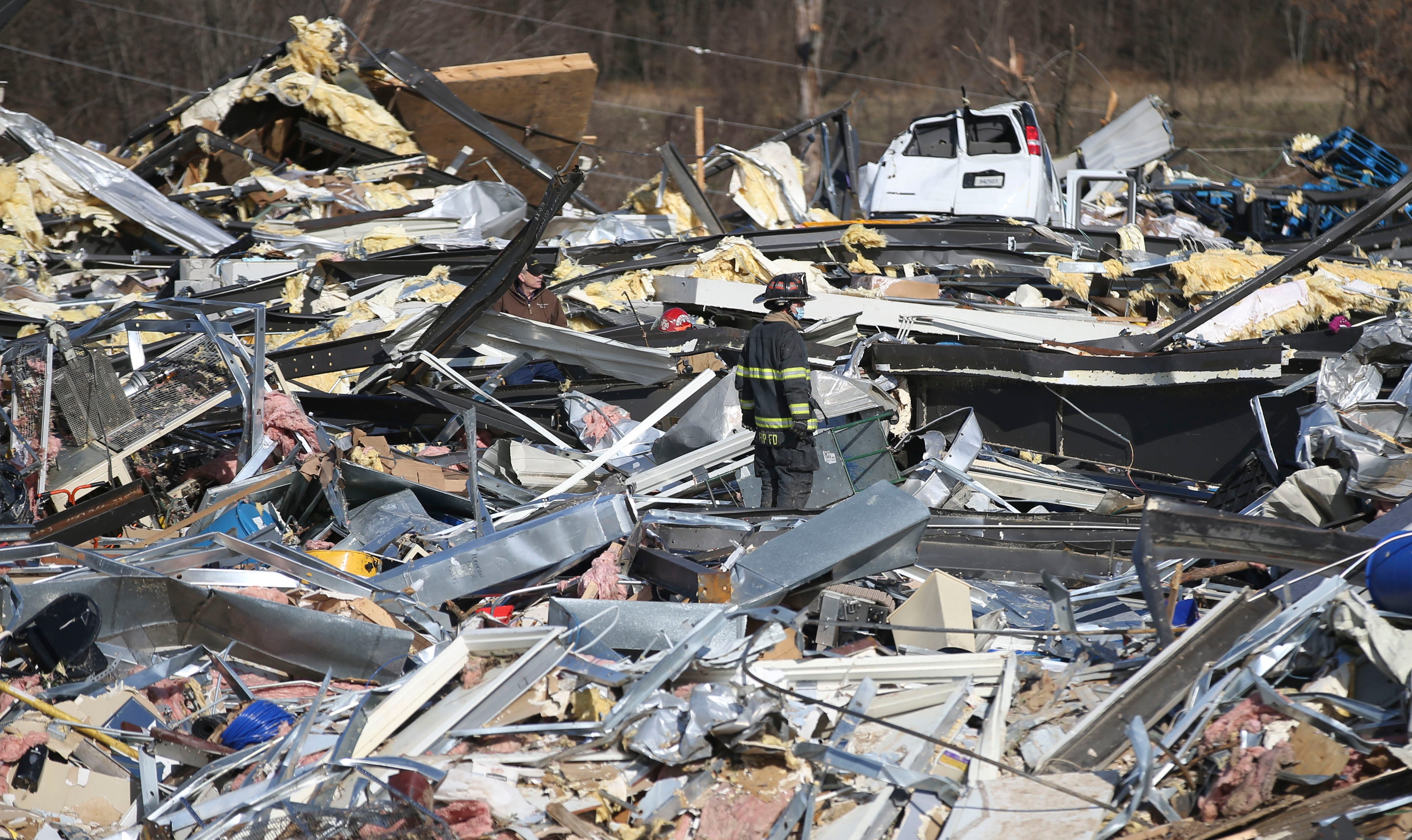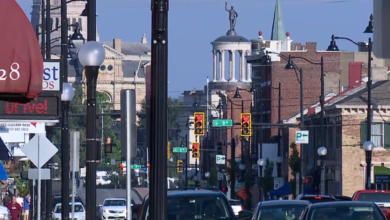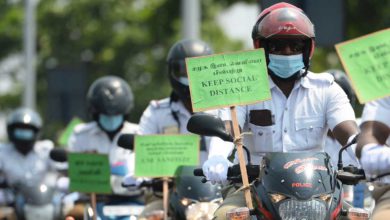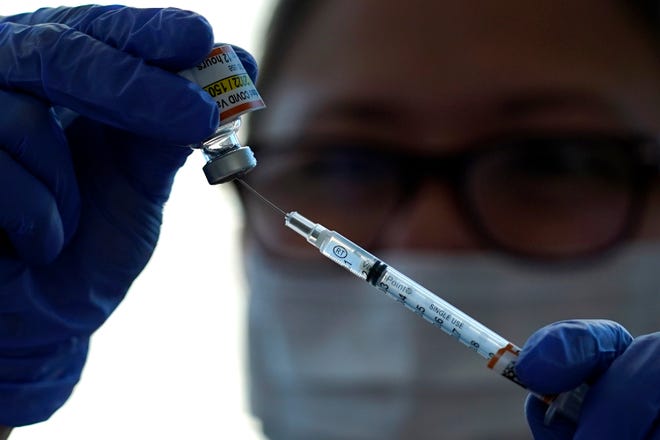
MAYFIELD, Ky. — At first, Chelsea Logue heard nothing. Then the screaming started.
She couldn’t move inside the smashed and splintered remains of the Mayfield Consumer Products candle factory at 112 Industrial Drive, one of the town's largest employers.
Her head was wedged between a five-gallon bucket of chemicals — the ones they used to make the candle scents — and a hallway wall that was supposed to provide shelter for the 110 people caught inside by the massive tornado that barreled through the building Friday night.
Live updates: Follow along for the latest Kentucky tornado news
On either side of her, people were pinned under the wall. She was certain this was how she was going to die.
The woman on top of Logue wriggled herself free and pushed through a crack in the drywall. Logue pried her head free and followed her up until she felt the cold December air and rain.
'I remember seeing everybody's face.' Inside the MCP factory during the tornado from 2 survivors
The only noise you could hear was the screams of the people that were trapped.' Inside the MCP factory from 2 survivors accounts.
Nate Chute, Matt Stone and Alton Strupp, Louisville Courier Journal
It was still dark when she clawed her way out of the rubble. An occasional flash of lightning lit the mangled steel and concrete where the workers were feverishly trying to meet the Christmas demand.
People yelled for help. Some prayed in different languages. Someone said their legs were broken. Another thought they’d been stabbed through the stomach.
Logue scooted cautiously along the expanse of rubble, uncertain of how many co-workers were still trapped below her. She spotted a flashlight beam and a first responder who yelled for her to test each step to make sure she didn’t fall.
She was buried alive for maybe an hour, she estimated, before she was able to climb to the surface. It took another hour, at least, to crawl to solid ground.
“I’ve been shaking since I walked out of the rubble,” she said. “It was horrific.”
Survivors recount escaping tornadoes in Kentucky, Arkansas
Mayfield 'candlestick factory' employee describes surviving tornado
Mayfield candle factory survivor Chelsea Logue describes tornado
Kentucky tornado victim must look home after apartment destroyed
Kentucky woman 'in shock' after losing home to tornado
Kentucky tornado: UK Research and Education Center destroyed
Kentucky tornadoes: Mayfield community Crosstown unites
'All we heard were screams': How a Mayfield man survived
This family survived the Kentucky tornadoes, tied to a sewer pipe in their home
At Moss Middle School in Bowling Green, those affected by the tornado pick up supplies
Tornadoes that struck Kentucky ripped the roof from this home
'We followed all safety protocols'
Five days have passed since the most fearsome tornadoes ever to hit Kentucky ripped through the commonwealth, leaving in their wake a 220-mile swath of destruction across 10 counties.
As of Saturday, at least 77 people have been confirmed dead, making it the deadliest storm in the commonwealth's history.
A Mayfield Consumer Products spokesman told The Courier Journal Monday afternoon eight people inside the factory were among those killed. The remaining 102 all survived and are accounted for, although state officials are still trying to confirm that information.
“We’ve had a miracle situation,” company spokesman Bob Ferguson said. “Only eight lost.”
But Logue and some of her coworkers want to know why the company didn’t decide to close and send workers home before the massive twister leveled the building, with some saying they were told they could be fired if they left.
“It should have been shut down,” said Logue, 22.

Matt Stone/USA TODAY NETWORK
Several candle factory employees who were injured in the storm have retained lawyers based out of Lexington and Washington, D.C., to file claims following the disaster.
The survivors allege numerous violations of law, including “a massive cover-up discovered within the last 24 hours with an incontrovertible smoking gun,” Amos Jones, one of the attorneys, said in a Tuesday night news release.
The plaintiffs are still employees and are not being named, except for Elijah Johnson, 20, a member of the candle factory production crew who was trapped under rubble while working the second shift Friday night, according to the news release.
The other workers in the legal case are not being identified by name "because of real-time reprisals that already have begun and expanded," the attorneys said in the release.
Attorney William Davis, based in Lexington, described the Friday night situation at the candle factory as "a modern-day sweatshop" due to workers wishing to go home as the storm system approached.
"Management at that factory caused, oversaw, and facilitated a shirking of decency with regard to duties of care, and faithful employees are now injured or dead, two weekends before Christmas," Davis said.
Ferguson, the CEO of a Washington, D.C.-based consulting group and personal friend of Mayfield Consumer Products CEO Troy Propes, defended the company’s decision to keep workers at the facility instead of sending them home.
“This was an unprecedented storm,” said Ferguson, who was brought on to be the spokesman after the factory collapse. “We followed all safety protocols. The safest place for our employees to be was in a sheltered location.”
The Courier Journal interviewed factory workers and company representatives to recreate the final hours before the tornado destroyed the building.
Here's what we found:
5 p.m. CST: ‘I didn’t want to go. But I need the money.’
The weather pattern that produced the supercell of tornados forms in northeast Arkansas. More than 200 miles away, National Weather Service staff in Paducah are watching the system, ready to issue tornado warnings for the region.
Jennifer Sanchez-Flores clocked in for her 10-hour shift in the factory’s quality department, making sure each candle was perfect before it's sent to buyers such as Procter & Gamble, Bath & Body Works and Victoria’s Secret.
Her boyfriend told her a bad storm was coming their way. But Sanchez-Flores, 23, lived in Mayfield all her life and had seen bad storms before.
“I didn’t think it would be a huge tornado,” she said.
Kentucky tornadoes: What to know about damage, death toll, how to help and more
As she arrived, the factory was humming with the sounds of machines and conversation from the multilingual staff. Of the company’s total workforce, Ferguson said 100 employees are native Spanish speakers.
Five were recruited from Puerto Rico. Seven employees were prisoners at the nearby Graves County jail, according to WFPL, part of a deal to provide jobs for those incarcerated.
Some workers worried about the impending storm. A few didn’t show up. Others, like Sanchez-Flores, didn’t think it was great cause for much concern.
They had plenty of work to do. The holidays were always the busiest for the factory, run by a family-owned company founded by Mary Propes, mother of the current CEO, in 1998.
The Graves County Economic Development’s website lists Mayfield Consumer Products as one of the county’s largest employers, and the company has 600 workers, according to Ferguson.
Crystal Thiel also saw the weather forecast and thought about staying home. But Christmas was two weeks away.
If she called off, she feared she’d risk losing the company’s incentive program: work enough hours in a week and employees could get bonus pay amounting to a few extra dollars an hour.
“Over and over I said I didn’t want to go,” she said. “But I need the money.”

Scott Utterback/USA TODAY NETWORK
A supervisor told Thiel when she got to the factory at 5 p.m. they had enough people doing quality assurance. Instead, she could help out with production and then with packaging the candles for shipment.
Less than a half-hour into her shift, Thiel heard a chorus of alerts and text messages on coworkers’ cellphones. She thought she heard the faint wail of a tornado siren.
The company’s emergency weather protocols kicked in. Staff headed to the building’s designated storm shelter, a long hallway connecting the plant floor to the lab where they mixed the caustic chemicals needed to create fragrances. Supervisors read aloud employee names, checking to make sure everyone was accounted for.
The supervisor near Sanchez-Flores got through maybe two-dozen names before the all-clear was given.
They were told to return to work.
6 p.m. CST: 'They knew it was heading toward us'
The National Weather Service received reports from law enforcement around Jonesboro, Arkansas, about a tornado. The weather pattern heads toward that state’s border with Missouri. National Weather Service staff in Paducah note its increasing rotation and potential to produce long-track tornadoes. They expect it to reach Kentucky around 8:30 p.m. CST.
Workers were trickling back to the plant floor when Chelsea Logue arrived to start her overnight shift.
Logue had worked at the factory for three months before leaving. This was her second week back.
One day earlier, she heard people talking about the approaching storm. They seemed worried. Logue wasn’t.
She was from the Tennessee mountains. Tornado warnings, she said, don’t typically amount to much.
“I thought it would be a rainstorm,” she said.
Her wife, however, who also works at the factory, decided to stay home with the couple’s 4-month-old baby.
Logue spotted a manager who told her the staff had been sheltering for a possible storm but it was safe to get back to work.
More: After surviving tornado, Mayfield residents anxiously wonder where they go from here
As production resumed, Sanchez-Flores saw a human resources staffer checking radar on her phone. Logue saw a manager doing the same.
Some workers asked to leave. A few did leave.
NBC News reported that other workers said they and their colleagues were warned they could be fired if they left. Ferguson, the company spokesman, denied those claims and said they are “incredibly false.”
“Employees can go home at any time without any penalty,” Ferguson said. “Since COVID has made it so difficult to find employees, we have mended our practices.
"If someone comes to work, and three hours into the shift, they say ‘I want to go home,’ they're free to go home without penalties, and they can come back to work the next day and start.”
But it wasn't that clear cut.
In fact, two employees told The Courier Journal they were warned about possible penalties if they left. But another said supervisors gave people the option of leaving during the night shift, and a fourth said the only time she heard supervisors stop people from going was when they were being told to shelter.
Sarah and Jacob Atkins knew a potentially dangerous storm was forecast during their candle factory late shift and considered not showing up.
Jacob Atkins said tornado warnings weren’t unusual. But the bigger factor was they didn’t want to lose the jobs they’d had for more than a month.
After the start of their shift, Jacob Atkins, a forklift operator, worried about how the building would handle a tornado, particularly when he was around 55-gallon drums and heavy equipment.
The couple debated leaving amid increasing storm warnings. Sarah said she asked if workers could leave the job.
“When we went around and started asking if we could go home, one of the HR (human resources) ladies told us that if we went home, we were going to be terminated because it was considered abandonment of our job,” Sarah Atkins said.
They debated leaving anyway. But they were working to save money for a home to regain custody of their five children in foster care and decided they couldn’t risk it, Sarah Atkins, 28, said.
“A lot of people just walked out was like, ‘screw you guys. I'm walking out. You can't tell me I have to stay,’” she said. “I was so torn … I need my job. If I lose it, where else am I supposed to go?”
In between putting lids on candles, Megan Wilder checked her phone and saw the weather alerts. She showed her team leader. If this got worse, she said, she was going to leave and be with her husband and their 1-year-old son.
The team leader told her she would lose a point if she left, she said. Employees had only so many points they could use for absences, or if they showed up late or needed to leave early.
If they went over their point total, they could lose their jobs, she said.
"I did have enough points," said Wilder, 27. "But right now our family is a little behind on bills, so I was trying to at least stay and make enough money to pay our rent and everything like that."
Scott Johnson, a wick operator at the plant, didn't work that Friday. But the coworkers and supervisors he's talked to since have said people did have the option to leave.
“Not one of them supervisors would tell you — if you leave, you’re fired. They’d never do that. I know these people,” he said. “A lot of people are upset, talking sh--, is what I think it is. I mean, it’s natural. Everybody wants to blame someone.”
As he spoke, the company help center asked him what he needed. He explained he’d been sleeping in his car and was down to less than $50. “I lost everything,” he said, saying later he felt the company was taking care of its workers in the tornado aftermath.
Jessica Martinez, co-executive director of the worker safety advocacy organization National Council for Occupational Safety and Health, said the fact that workers were debating whether to leave and some based their decisions on whether to risk lost wages means there either wasn’t a preparedness plan or it wasn’t being followed.
“Were they thinking about their wages or survival? If there was a plan in place, those discussions would not have been taking place,” she said.
Jeff Schlegelmilch, director of the National Center for Disaster Preparedness at Columbia University, said plans need to consider how long it will take to get to safety. At some point, he said, the only decision left is to shelter in place.

Alton Strupp/Courier Journal
"By the time you have enough to feel confident about the decision (to leave) it can very likely be too late," he said.
Sanchez-Flores said the only time she heard supervisors tell employees not to leave was when they were getting warnings to seek shelter — when there was a concern they would be in danger if they went outside.
Still, she and others said the company had three-plus hours to close the factory and safely send workers home before the tornado hit.
“They knew it was heading toward us,” she said. “By the time they told us to go back to work, they should have said, ‘Hey, this might be coming straight toward us. Go home.’ They should have sent us home.”
9 p.m. CST: ‘Cover your heads!’
The tornado heading straight for the candle factory had already carved a path through Leachville, Arkansas, and damaged property in Fulton County, Kentucky. The alerts from the National Weather Service in Paducah grow more dire. They warn of a “dangerous storm” and direct people in Mayfield to “shelter immediately!” The violent tornado reaches the city 27 minutes later.
Crystal Thiel heard cellphones buzzing again. She heard the sirens outside.
People started running back to the shelter. She and three friends went to the doorframe near the water fountains by the bathrooms — supposedly the safest place in the building.
She sat against the wall, clutching her cellphone with one hand and her friend’s arm with the other.
Sanchez-Flores stayed back with two supervisors to help shut the line down, fearful of a potential fire hazard if a tornado did hit.
Her dad called: A tornado’s coming! Find shelter!
“I’m running over there now,” she told him.
Supervisors yelled out names.
There was an eerie silence. People’s ears popped. Lights flickered.
Sanchez-Flores’ national guard training kicked in. She screamed out: "Cover your heads!"

Matt Stone/USA TODAY NETWORK
Sanchez-Flores could barely breathe through the drywall particles that filled the air. She pressed her back against the wall pinning her and others down. It was too heavy to move.
She thought about her kids, ages 2 years and 5 months. She had to get out, she thought, had to see them again.
Through the haze, she saw a hole. She climbed through it, stopping only when she inhaled fresh air.
Three people were pressed on top of Thiel, buried under a wall. They could feel people walking over the rubble, each step driving the wall into their battered bodies. They screamed for help, for the people up there to stop walking over them.
One by one, with help, they freed themselves enough to climb up to the surface. Once there, Thiel's company radio provided the only light in the darkness as they gingerly made their way off the ruins.
A voice came over the radio. A woman was trapped and not breathing. When her name was said, a supervisor behind Thiel snatched the radio out of her hand and bolted across the rubble. It was his wife.
Thiel later heard she survived and the couple was heading back to Puerto Rico.
'The only thing I hear is everyone's screams'
Sarah Atkins woke up under a collapsed wall. A friend was yelling at her to get out. She called her father under the rubble.
“We’re hit, dad,” she said.
She climbed out and helped others to safety. Jacob Atkins said he came to still holding the door he’d been gripping before being blown out of the factory.
“I knew my wife was still in the building. So I came back down to the building and started climbing up over all the rubble and stuff. And I kept finding people, helping them get back out of the building,” he said. “I finally found my wife. She was OK. She had hurt her leg and broke a vertebrae in her back while helping others escape.
"People were just kind of sitting in the rubble, crying."
Megan Wilder couldn't move the metal beam pressing down along her spine. She was able to reach into her pocket and get her cellphone to call family and tell them she was alive, but trapped.
All around her, people screamed for help. Wilder could feel the cold rain hitting her. She heard someone overhead yell for a crowbar and a saw to cut them out.
It was shortly after midnight when rescue workers finally freed Wilder. She managed to escape with minor cuts and bruises.
The mental and emotional wounds are much deeper.
"I can't sleep," she said. "The only thing I hear is everyone's screams."
'What steps did they take to protect their employees?'
Sarah Atkins was taken to a hospital in Paducah. Chelsea Logue was treated for a concussion and bruises.
Jennifer Sanchez-Flores is taking medication for back pains, possibly from a pinched nerve. Crystal Thiel is planning to see a specialist for her back pain.
Since the tornado hit, employees have gathered in Mayfield and connected on social media to talk about who they’ve heard from, who’s still missing, who they’ve lost.
Meanwhile, questions continue to swirl around the company’s decision to stay open Friday night.
“How much notice did they have of this weather system and this tornado in particular,” asked John Caudill, an Owensboro-based attorney and former federal prosecutor who unsuccessfully sued the company in 2020 on behalf of an employee recruited from Puerto Rico who claimed he was fired because of his weight.
“How sound was the structure? What steps did they take to protect their employees?”
Kentucky's Division of Occupational Safety and Health Compliance has launched an investigation that could take up to six months to complete, a spokeswoman said.
State Senator Morgan McGarvey, D-Louisville, said he planned to file a bill "to hold accountable those who force workers to stay and risk their lives during severe weather."
Sarah Atkins believes the company should have either canceled work or presented employees with an option of leaving earlier in the shift. Her husband said the company should have called off work.
But others could have been killed in their homes just as easily, she said. Her father, who they were living with, survived.
“You think, if I would have gone home, would I still be alive?” she asked.
She has lost her car, which only carried liability insurance. She expects to get worker’s compensation pay, a percentage of her $12.50 wage. But isn’t sure where to go from here.

Matt Stone/USA TODAY NETWORK
Sanchez-Flores has similar concerns. She remains convinced her employers should have handled the factory disaster differently.
“We never should have been in that situation,” she said. “No candle is worth anybody’s life.”
Reporter Billy Kobin contributed to this story.
Reach Jonathan Bullington: 502-582-4241; [email protected]; Twitter: @jrbullington. Ben Tobin: 502-377-5675; [email protected]; Twitter @Ben__Tobin. Matt Mencarini: 502-582-4221; [email protected]; Twitter: @MattMencarini.







